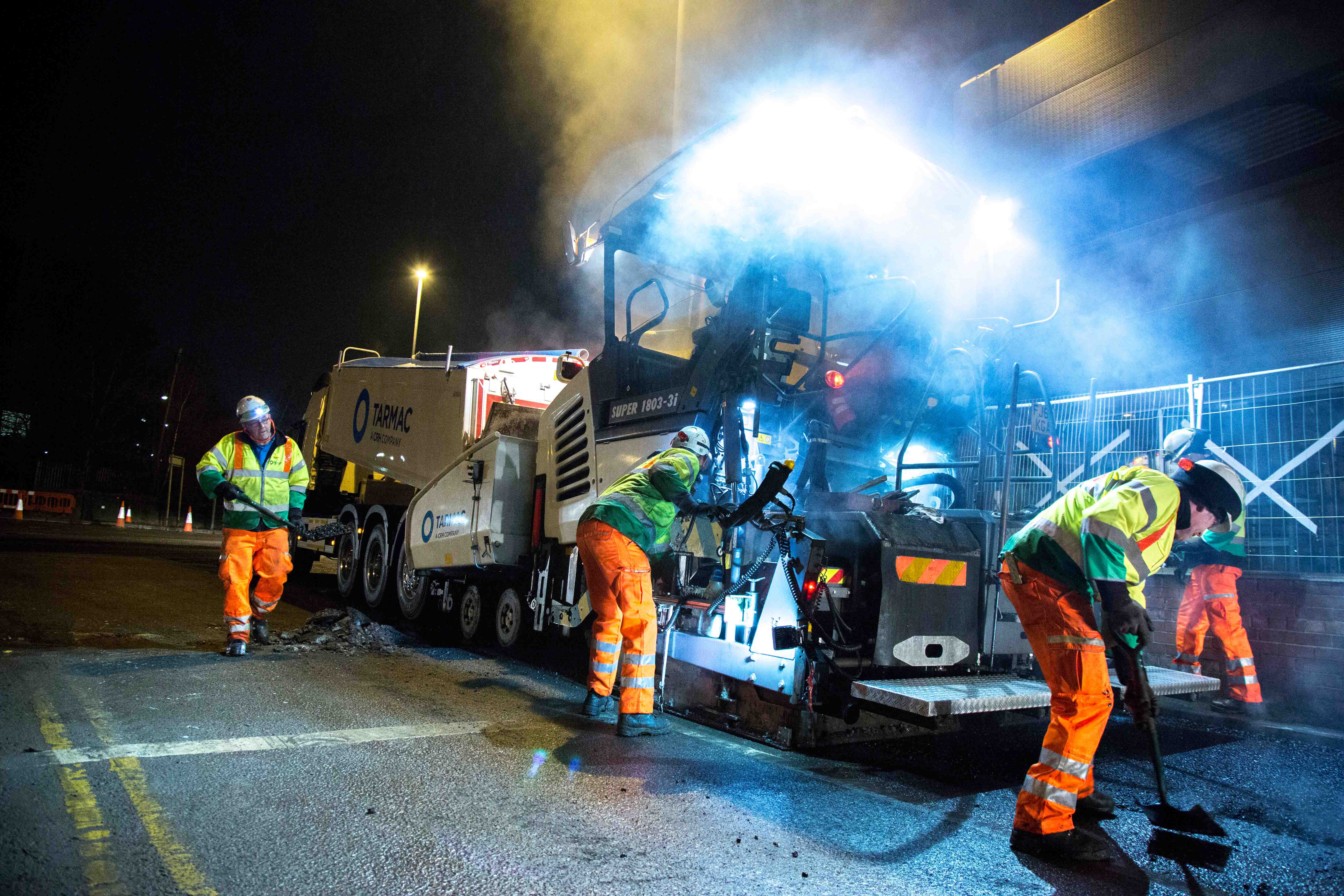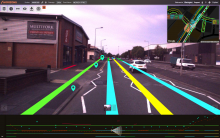UK contractor Tarmac has been in partnership with Symology since 2011, using a shared management service for asset management to meet tougher government street work regulations, writes Matt Waite
Tarmac, with more than 6,600 employees, is the UK’s leading sustainable building materials and construction solutions business. The company has over 330 UK sites from which it delivers contracting and highways maintenance services as well as products such as aggregates, asphalt, cement, lime and ready-mix concre

Paving is always a race against time
UK contractor Tarmac has been in partnership with Symology since 2011, using a shared management service for asset management to meet tougher government street work regulations, writes Matt Waite
2399 Tarmac, with more than 6,600 employees, is the UK’s leading sustainable building materials and construction solutions business. The company has over 330 UK sites from which it delivers contracting and highways maintenance services as well as products such as aggregates, asphalt, cement, lime and ready-mix concrete. It also offers a range of recycling services. Like all contracting and highway maintenance companies, Tarmac is under increasing pressure to reduce the penalties it receives from the imposition of government’s latest street works regulations. Also, much of the information and communication between contractor and local authority must be carried out electronically (see next page).
At the same time, Tarmac is committed to streamlining efficiency throughout its operations. Having been a5236 Symology client since 2011 using a shared managed service solution, Tarmac became a full Street Works Managed Service customer in 2014 when they were successful in winning a 10-year highways contract with Norfolk County Council. Following the success of the Norfolk implementation, Tarmac continued to grow their use of Symology’s Insight across other local government maintenance contracts such as Halton Borough, Warrington Borough and Wiltshire County Council.
However, despite pre-existing works order management systems within these counties, the systems were missing vital EtON6 compliant applications for road space booking.
Tim Copping, technology manager for the Tarmac Contracting & Maintenance businesses, provides an insight into the rapid and straightforward transition to the Managed Service. “In 2011, we started off as a “pay-per-works” customer, which offered us the facility to raise a small number of notices on a shared managed service solution and for Symology to invoice us on a per-operational basis. Fast forward to 2014, we had just won a 10-year highways contract with Norfolk County Council. It then seemed a safe and secure route to upgrade to a full Street Works Managed Service.
"Following the success in Norfolk with a rapid implementation, it wasn’t a difficult decision to use Insight to assist us with our work in Halton, Warrington and Wiltshire in our bid to reduce to the minimum the penalties we receive from a Street Works perspective.”
Copping says that the move to a dedicated hosted solution was the culmination of Tarmac's progress in meeting many important milestones in the company's operational timeline during the previous five years. "One of the most important of these was Norfolk becoming a Permitting Authority. Once we had implemented Symology’s Insight with them, Wiltshire, Warrington and Halton followed suit.”
With this work, Tarmac also took the decision to implement Symology’s Insight Enterprise edition, explains Copping. “The highway maintenance service we were providing to Knowsley included among other things inspections and provision of a works order management system."
The first phase was for highways inspections and recording of defects. All three parties involved, with Knowlsey having representation at all project meetings. Workshops were held between all stakeholders to understand and gather information on workflows and processes. These were then used in the configuration of Symology’s Insight to ensure the maximum benefits and savings were gained.
"During the go-live project, we were in pretty much constant dialogue with both Symology and Knowsley to ensure that everyone was aware of the programme, durations for mobilisation, delivery and training. As well as the usual monthly meetings, we held scoping meetings to ensure that everyone was on the same page in terms of contractual commitments and what services were being delivered.”
We have also made a request to Symology for the creation of specific asset setups to include highway features that could be included within cyclical activities. We have already received the ability to create specific reports designed on the Norfolk contract for notification of forthcoming permit closures. This includes work start-and-stop notices, which are sent out via a schedule to specific users within the business."
On the subject of training for the new system, Copping says that after transition to the new system, bringing all staff up to speed has been a very quick and easy process. "The majority of our users undertake a Symology two–day course in Street Works to prepare them for using the new software in the field. Training includes skills for mobile users and works planners. During the training process, all staff are also provided with training for the Knowsley County Council client on general maintenance, which covers approval of works and system administration, use and search methods.”
Copping believes that the user experience is very positive. “Overall performance of the software has proven to be excellent so far. The system has been adopted by most of our users easily and quickly. We’ve found through system use and trial and error that sometimes we need additional or even decreased functionality in certain places."
Symology has been able to tweak their application to make it work for Tarmac, he explains. "This is great for user buy-in as they see changes being implemented quickly. Another really great aspect of Symology’s solution is the fact that the system is hosted and accessed through a web browser. This means that we have not incurred any in-house technical issues with installation of executable applications or managing updates ourselves, as everything happens on Symology’s side. In terms of system changes or downtime, Symology has always advised or warned us well in advance and their people are always available in the event of any technical troubles.”
“At Tarmac, it is no exaggeration to say that we rate Symology as industry experts," says Copping. "We currently rely on Symology in an advisory capacity when it comes to implementing solutions to many process-driven workflows. There is a high level of trust and confidence that has led to us continually returning to Symology for solutions. “Overall, the key reasons why Tarmac has worked with Symology on such a consistent basis are excellent customer service, proven success rates and the stability of their managed service environment. This track record is the reason why Symology is a market leader within the industry. Their after-sales and technical support is exceptional, and their technical team is always available to provide support and assistance to ensure that we can resolve problems as soon as possible."
The time before benefits are seen from the new solution is between 18 months and two years. "While we are not currently integrating with any other applications, our efficiency improvements include reduced FPN levels and the introduction of standard working practices, which will assist with supporting bid submissions through evidence of service delivery.
Many of our efficiency savings also come through the use of a cloud-based solution. There are periodic patch releases to fix errors and bugs and also to enhance the system. On the managed services there are four quarterly updates which are optional and include both mobile and core applications.
Copping believes that the success of the new system is just one in a long line of successes that Tarmac has gained through working with Symology. "The service Symology provides is extremely high quality and refreshingly honest and the Insight solution is incredibly flexible, being configurable to match business processes and work flows," says Coping.
"Tarmac continues to work closely with Symology and the trust developed aims for the two companies to work closely together in future contracts with scope for additional features being implemented, such as further back office integrations.”
Doing it by the book
The UK-wide Traffic Management Act 2004 details the street works regulations.
Importantly, street works are necessary to provide and maintain utility and transport services, but can be disruptive to road users. Street works are different from road works, which are works carried out to repair or improve the highway including footways, pavements and street lighting.
Contractors must apply for a permit to work on a street and discuss and agree with the local highway authority the conditions and restrictions concerning the project, such as work periods and equipment to be used. Penalties are handed out for transgressions by the contractor.
As well, contractors must comply with5432 Department for Transport’s EtON6 rules and regulations - Electronic transfer Of Notifications version 6 - during operational processes such as the management of road space booking. To do this, both contractor and local authority must exchange a substantial volume of information about street works by using an electronic transfer of notifications (ETON) system for doing so.
At the same time, Tarmac is committed to streamlining efficiency throughout its operations. Having been a
However, despite pre-existing works order management systems within these counties, the systems were missing vital EtON6 compliant applications for road space booking.
Implementing Insight
Tarmac took the decision to implement Symology’s multi-tenanted Insight for Street Works solution across all four of these council areas to eliminate where at all possible the penalties they receive from a Street Works perspective. Also, there are many other regular tasks that Tarmac needs to perform in their work with these councils, including a monthly gazetteer update for all local authority areas in which Tarmac operates. It relies on Symology to manage these processes.Tim Copping, technology manager for the Tarmac Contracting & Maintenance businesses, provides an insight into the rapid and straightforward transition to the Managed Service. “In 2011, we started off as a “pay-per-works” customer, which offered us the facility to raise a small number of notices on a shared managed service solution and for Symology to invoice us on a per-operational basis. Fast forward to 2014, we had just won a 10-year highways contract with Norfolk County Council. It then seemed a safe and secure route to upgrade to a full Street Works Managed Service.
"Following the success in Norfolk with a rapid implementation, it wasn’t a difficult decision to use Insight to assist us with our work in Halton, Warrington and Wiltshire in our bid to reduce to the minimum the penalties we receive from a Street Works perspective.”
Copping says that the move to a dedicated hosted solution was the culmination of Tarmac's progress in meeting many important milestones in the company's operational timeline during the previous five years. "One of the most important of these was Norfolk becoming a Permitting Authority. Once we had implemented Symology’s Insight with them, Wiltshire, Warrington and Halton followed suit.”
Continued expansion
Following the success of the multi-tenanted Street Works solution, the latest expansion came about as a result of Tarmac winning the highways maintenance contract for Knowsley Council in Merseyside, north-west England. Merseyside itself was a Symology customer for a Street Works Managed Service. This contract sees Tarmac delivering highways surfacing, bridge and structures maintenance a well as gully cleansing and footway and carriageway repairs.With this work, Tarmac also took the decision to implement Symology’s Insight Enterprise edition, explains Copping. “The highway maintenance service we were providing to Knowsley included among other things inspections and provision of a works order management system."
Go Live
Copping acknowledged that the Knowsley contract brought new pressures, especially as implementation was to be over a very short time. “Our very first meeting was November 23, 2015 and the contract specified that the go-live date was to be the following February 1 - just 10 weeks later. We pulled out all the stops within Tarmac, but meeting the date was greatly helped by Symology using resources from around the UK."The first phase was for highways inspections and recording of defects. All three parties involved, with Knowlsey having representation at all project meetings. Workshops were held between all stakeholders to understand and gather information on workflows and processes. These were then used in the configuration of Symology’s Insight to ensure the maximum benefits and savings were gained.
"During the go-live project, we were in pretty much constant dialogue with both Symology and Knowsley to ensure that everyone was aware of the programme, durations for mobilisation, delivery and training. As well as the usual monthly meetings, we held scoping meetings to ensure that everyone was on the same page in terms of contractual commitments and what services were being delivered.”
Future enhancement
Symology’s Insight delivers the majority of Tarmac’s requirements, but work is already underway on an evaluation process to define and agree further enhancements to the solution. “We have made a couple of requests for additional functionality,” says Copping. “For example, we have asked for a couple of enhancements for mobile devices, including the addition and creation of ad hoc defects, while completing inspections without closing down and actually removing the highway inspection.We have also made a request to Symology for the creation of specific asset setups to include highway features that could be included within cyclical activities. We have already received the ability to create specific reports designed on the Norfolk contract for notification of forthcoming permit closures. This includes work start-and-stop notices, which are sent out via a schedule to specific users within the business."
On the subject of training for the new system, Copping says that after transition to the new system, bringing all staff up to speed has been a very quick and easy process. "The majority of our users undertake a Symology two–day course in Street Works to prepare them for using the new software in the field. Training includes skills for mobile users and works planners. During the training process, all staff are also provided with training for the Knowsley County Council client on general maintenance, which covers approval of works and system administration, use and search methods.”
Copping believes that the user experience is very positive. “Overall performance of the software has proven to be excellent so far. The system has been adopted by most of our users easily and quickly. We’ve found through system use and trial and error that sometimes we need additional or even decreased functionality in certain places."
Symology has been able to tweak their application to make it work for Tarmac, he explains. "This is great for user buy-in as they see changes being implemented quickly. Another really great aspect of Symology’s solution is the fact that the system is hosted and accessed through a web browser. This means that we have not incurred any in-house technical issues with installation of executable applications or managing updates ourselves, as everything happens on Symology’s side. In terms of system changes or downtime, Symology has always advised or warned us well in advance and their people are always available in the event of any technical troubles.”
Working with Symology
Tarmac and Symology have worked closely together since 2011 to improve and enhance the Insight product for mutual benefit and the new managed service solution has further strengthened this relationship.“At Tarmac, it is no exaggeration to say that we rate Symology as industry experts," says Copping. "We currently rely on Symology in an advisory capacity when it comes to implementing solutions to many process-driven workflows. There is a high level of trust and confidence that has led to us continually returning to Symology for solutions. “Overall, the key reasons why Tarmac has worked with Symology on such a consistent basis are excellent customer service, proven success rates and the stability of their managed service environment. This track record is the reason why Symology is a market leader within the industry. Their after-sales and technical support is exceptional, and their technical team is always available to provide support and assistance to ensure that we can resolve problems as soon as possible."
The time before benefits are seen from the new solution is between 18 months and two years. "While we are not currently integrating with any other applications, our efficiency improvements include reduced FPN levels and the introduction of standard working practices, which will assist with supporting bid submissions through evidence of service delivery.
Many of our efficiency savings also come through the use of a cloud-based solution. There are periodic patch releases to fix errors and bugs and also to enhance the system. On the managed services there are four quarterly updates which are optional and include both mobile and core applications.
Copping believes that the success of the new system is just one in a long line of successes that Tarmac has gained through working with Symology. "The service Symology provides is extremely high quality and refreshingly honest and the Insight solution is incredibly flexible, being configurable to match business processes and work flows," says Coping.
"Tarmac continues to work closely with Symology and the trust developed aims for the two companies to work closely together in future contracts with scope for additional features being implemented, such as further back office integrations.”
Doing it by the book
The UK-wide Traffic Management Act 2004 details the street works regulations.
Importantly, street works are necessary to provide and maintain utility and transport services, but can be disruptive to road users. Street works are different from road works, which are works carried out to repair or improve the highway including footways, pavements and street lighting.
Contractors must apply for a permit to work on a street and discuss and agree with the local highway authority the conditions and restrictions concerning the project, such as work periods and equipment to be used. Penalties are handed out for transgressions by the contractor.
As well, contractors must comply with









